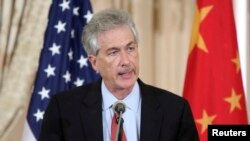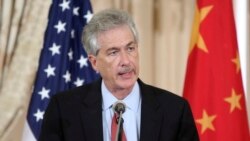“Building a more constructive and cooperative relationship between the United States and China is vital to our future and will contribute to a more peaceful, stable, and prosperous world,” U.S. Deputy Secretary of State William Burns said at the closing of the U.S.-China Strategic and Economic Dialogue in Washington DC.
Effectively addressing today’s international challenges, from climate change to nuclear proliferation and poverty to cyber security, requires an active and sustained partnership between China and the United States.
“The important initiatives we’ve announced on climate change, and China’s pledge to enhance the transparency of its energy data reflects our shared commitment to securing sustainable, affordable energy and reducing greenhouse gas emissions,” Deputy Secretary Burns said.
“We . . . have an obligation to adhere to international rules and norms,” he continued. “This is true on a wide range of issues from maritime security in East Asia, to our trade and investment ties, to how we treat our people.”
“Cyber security is a critical new area where we need to reach a shared understanding of the rules of the road,” Deputy Secretary emphasized. “We underscored that the cyber-enabled theft of trade secrets, intellectual property, and confidential business information is unacceptable.”
“U.S.-China relations remain a work in progress,” Deputy Secretary Burns said. “When we encounter differences or sensitive issues, we need to address them directly.
“We also expressed our ongoing concerns about human rights in China, particularly recent instability in Tibetan and Uighur areas of China,” Deputy Secretary Burns said reaffirming the importance of human rights to the bilateral relationship. “We firmly believe that respect for universal rights and fundamental freedoms will make China more peaceful, more prosperous, and ultimately more secure.”
“We must . . . continue to build ties not only between governments but also between our peoples,” Deputy Secretary Burns said in conclusion. “Our growing people-to-people contacts may be the most consequential and enduring legacy of our diplomacy.”
Anncr: That was an editorial reflecting the views of the United States Government. If you have a comment, please write to Editorials, V-O-A, Washington, D-C, 20237, U-S-A. You may also comment -- and view all our current editorials -- at the V-O-A Editorials home page: www-dot-voanews-dot-com-slash-editorials.
Effectively addressing today’s international challenges, from climate change to nuclear proliferation and poverty to cyber security, requires an active and sustained partnership between China and the United States.
“The important initiatives we’ve announced on climate change, and China’s pledge to enhance the transparency of its energy data reflects our shared commitment to securing sustainable, affordable energy and reducing greenhouse gas emissions,” Deputy Secretary Burns said.
“We . . . have an obligation to adhere to international rules and norms,” he continued. “This is true on a wide range of issues from maritime security in East Asia, to our trade and investment ties, to how we treat our people.”
“Cyber security is a critical new area where we need to reach a shared understanding of the rules of the road,” Deputy Secretary emphasized. “We underscored that the cyber-enabled theft of trade secrets, intellectual property, and confidential business information is unacceptable.”
“U.S.-China relations remain a work in progress,” Deputy Secretary Burns said. “When we encounter differences or sensitive issues, we need to address them directly.
“We also expressed our ongoing concerns about human rights in China, particularly recent instability in Tibetan and Uighur areas of China,” Deputy Secretary Burns said reaffirming the importance of human rights to the bilateral relationship. “We firmly believe that respect for universal rights and fundamental freedoms will make China more peaceful, more prosperous, and ultimately more secure.”
“We must . . . continue to build ties not only between governments but also between our peoples,” Deputy Secretary Burns said in conclusion. “Our growing people-to-people contacts may be the most consequential and enduring legacy of our diplomacy.”
Anncr: That was an editorial reflecting the views of the United States Government. If you have a comment, please write to Editorials, V-O-A, Washington, D-C, 20237, U-S-A. You may also comment -- and view all our current editorials -- at the V-O-A Editorials home page: www-dot-voanews-dot-com-slash-editorials.






